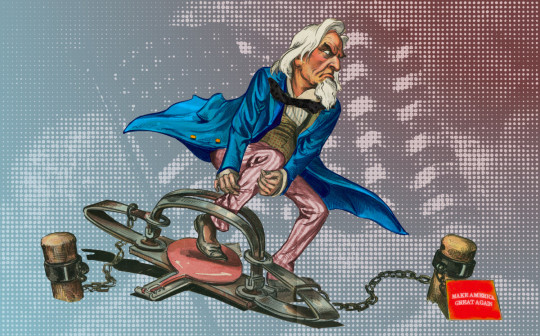#Cryptocurrency.
Explore tagged Tumblr posts
Text
For the longest time, when people would say "Cryptocurrency," this is what I'd imagine.

#cryptid#cryptids#loch ness monster#chupacabra#mothman#ahool#jersey devil#bigfoot#crypto#cryptocurrency
18K notes
·
View notes
Text
The Evolution of Bitcoin Mining
The transition From #GPUs to #ASICs redefined Bitcoin mining, pushing it towards industrial-scale operations. #BitcoinMining
In the early days of Bitcoin mining, hobbyists and crypto enthusiasts mined Bitcoin using just a standard computer equipped with a multi-core CPU. Back in 2009, these setups earned miners 50 BTC per block with minimal competition and computing power requirements. Mining was relatively simple and accessible, allowing participants to secure the Bitcoin network and earn rewards using basic…
#ASIC mining#Bitcoin#bitcoin mining#bitcoin mining history#Blockchain Technology#btc history#computational power#crypto mining#cryptocurrency.#custom-built#energy efficiency#GPUs#hash rate#network security#The Evolution of Bitcoin Mining
1 note
·
View note
Text
Can we be done with cryptocurrency now? Please?
We've been on this train for a while now:
Investing in Cryptocurrency is Bad and Stupid
2K notes
·
View notes
Text
“Dead NFTs: The Evolving Landscape of the NFT Market” is a new report from dappGambl, a community of experts in finance and blockchain technology. Upon analysis of 73,257 NFT collections, the authors found that 69,795 have a market cap of zero Ether (ETH), the second most-popular cryptocurrency behind Bitcoin. In practical terms, that means 95 percent of NFTs wouldn’t fetch a penny today — a spectacular crash for assets that reached a trading volume of $17 billion amid a frenzied bull market in 2021. The study estimates that some 23 million investors own these tokens of no practical use or value.
[...]
The “Dead NFTs” report observes that the nearly 200,000 NFT collections “with no apparent owners or market share” identified by the study caused carbon emissions equivalent to the annual output from 2,048 houses, or 3,531 cars.
10K notes
·
View notes
Text
Bitechchain: The Revolutionary MLM Platform Built on Blockchain Technology
Meta Description: Learn about Bitechchain, a groundbreaking MLM platform that harnesses the power of blockchain technology to enhance security and transparency. Discover how Bitechchain's decentralized and tamper-proof system is transforming the MLM industry, and explore the benefits of using cryptocurrency and smart contracts for MLM programs.
#Bitechchain#MLM#blockchain#decentralized#security#transparency#smart contracts#cryptocurrency.#network marketing companies#mlm marketing#mlm products#multi marketing#mlm network marketing#what mlm#multi level marketing business#multi level marketing schemes
0 notes
Text
Exploring Ellipsis Crypto: A DeFi Platform for Stablecoin Liquidity Pools
Ellipsis Crypto is a decentralized finance (DeFi) project built on the Binance Smart Chain (BSC). It was launched in March 2021 with the aim of providing users with access to low-cost and efficient financial services. Ellipsis Crypto is built to offer stablecoin-based liquidity pools with low fees, high yield, and low slippage for traders. In this article, we will take a closer look at Ellipsis Crypto and how it works.
What is Ellipsis Crypto?
Ellipsis Crypto is a DeFi platform that offers liquidity pools for stablecoins. Stablecoins are cryptocurrencies that are designed to maintain a stable value, usually pegged to a fiat currency such as the US dollar. The stablecoins supported by Ellipsis Crypto are USDT, BUSD, USDC, and DAI. These stablecoins can be deposited into liquidity pools, where they can be used to earn yield and provide liquidity for trades.
How does Ellipsis Crypto work?
Ellipsis Crypto works by allowing users to deposit their stablecoins into liquidity pools. When users deposit their stablecoins, they receive Ellipsis Crypto's native token, EPS, which can be used to vote on proposals and earn rewards. The liquidity pools on Ellipsis Crypto are automated market makers (AMMs), which means that they use algorithms to set prices and manage liquidity. This allows traders to trade stablecoins with low fees and low slippage.
Benefits of using Ellipsis Crypto
One of the main benefits of using Ellipsis Crypto is the low fees. Because Ellipsis Crypto is built on the Binance Smart Chain, users can take advantage of the low transaction fees that the chain offers. This means that users can deposit and withdraw their stablecoins with minimal fees, making it a cost-effective way to trade stablecoins. Another benefit of using Ellipsis Crypto is the high yield. By depositing stablecoins into the liquidity pools, users can earn rewards in the form of EPS tokens. These rewards are generated by trading fees on the platform, and they are distributed to liquidity providers on a regular basis. This means that users can earn a passive income by simply holding their stablecoins in the liquidity pools. In addition to the low fees and high yield, Ellipsis Crypto also offers low slippage for traders. Slippage is the difference between the expected price of a trade and the actual price of the trade. When there is high volatility in the market, slippage can be significant, resulting in traders losing money. However, because Ellipsis Crypto uses AMMs, the slippage is generally low, making it a more reliable platform for traders.
EPS token
EPS is Ellipsis Crypto's native token. It is used for voting on proposals and earning rewards. When users deposit stablecoins into the liquidity pools, they receive EPS tokens in return. These tokens can be used to vote on proposals that affect the future of the platform. The more EPS tokens a user holds, the more voting power they have. Additionally, EPS holders can earn rewards in the form of trading fees generated by the platform.
Future of Ellipsis Crypto
The future of Ellipsis Crypto looks bright. As more users discover the benefits of using the platform, the liquidity pools will grow, leading to even lower fees and higher yield. Additionally, as more proposals are voted on and implemented, the platform will continue to evolve and improve. The team behind Ellipsis Crypto is dedicated to building a platform that is both efficient and user-friendly, and they are constantly working on new features and improvements.
Conclusion
Ellipsis Crypto is a DeFi platform that offers stablecoin liquidity pools with low fees, high yield, and low slippage. By depositing stablecoins into the liquidity pools, users can earn rewards in the form of EPS tokens and provide liquidity for trades. Read the full article
0 notes
Text
I know I shouldn't have googled him after all these years but it's no surprise Sgnörvu owns a cybertruck and trades crypto now:


That slimy asshole, some eldritch beings get everything handed to them in life.
594 notes
·
View notes
Text
“That Makes Me Smart”

If you'd like an essay-formatted version of this post to read or share, here's a link to it on pluralistic.net, my surveillance-free, ad-free, tracker-free blog:
https://pluralistic.net/2024/12/04/its-not-a-lie/#its-a-premature-truth

The Biden administration disappointed, frustrated and enraged in so many ways, including abetting a genocide – but one consistent bright spot over the past four years was the unseen-for-generations frontal assault on corporate power and corporate corruption.
The three words that define this battle above all others are "unfair and deceptive" – words that appear in Section 5 of the Federal Trade Commission Act and other legislation modeled on it, like USC40 Section 41712(a), which gives the Department of Transportation the power to ban "unfair and deceptive" practices as well:
https://pluralistic.net/2023/01/10/the-courage-to-govern/#whos-in-charge
When Congress created an agency to punish "unfair and deceptive" conduct, they were saying to the American people, "You have a right not to be cheated." While this may sound obvious, it's hardly how the world works.
To get a sense of how many ripoffs are part of our daily lives, let's take a little tour of the ways that the FTC and other agencies have used the "unfair and deceptive" standard to defend you over the past four years. Take Amazon Prime: Amazon executives emailed one another, openly admitting that in their user tests, the public was consistently fooled by Amazon's "get free shipping with Prime" dialog boxes, thinking they were signing up for free shipping and not understanding that they were actually signing up to send the company $140/year. They had tested other versions of the signup workflow that users were able to correctly interpret, but they decided to go with the confusing version because it made them more money:
https://arstechnica.com/tech-policy/2024/05/amazon-execs-may-be-personally-liable-for-tricking-users-into-prime-sign-ups/
Getting you signed up for Prime isn't just a matter of taking $140 out of your pocket once – because while Amazon has produced a greased slide that whisks you into a recurring Prime subscription, the process for canceling that recurring payment is more like a greased pole you must climb to escape the Prime pit. This is typical of many services, where signing up happens in a couple clicks, but canceling is a Kafkaesque nightmare. The FTC decided that this was an "unfair and deceptive" business practice and used its authority to create a "Click to Cancel" rule that says businesses have to make it as easy to cancel a recurring payment as it was to sign up for it:
https://www.theregister.com/2023/07/12/ftc_cancel_subscriptions/
Once businesses have you locked in, they also spy on you, ingesting masses of commercial surveillance data that you "consented" to by buying a car, or clicking to a website, or installing an app, or just physically existing in space. They use this to implement "surveillance pricing," raising prices based on their estimation of your desperation. Uber got caught doing this a decade ago, raising the price of taxi rides for users whose batteries were about to die, but these days, everyone's in on the game. For example, McDonald's has invested in a company that spies on your finances to determine when your payday is, and then raises the price of your usual breakfast sandwich by a dollar the day you get paid:
https://pluralistic.net/2024/06/05/your-price-named/#privacy-first-again
Everything about this is "unfair and deceptive" – from switching prices the second you click into the store to the sham of consent that consists of, say, picking up your tickets to a show and being ordered to download an app that comes with 20,000 words of terms and conditions that allows the company that sends you a QR code to spy on you for the rest of your life in any way they can and sell the data to anyone who'll buy it.
As bad as it is to be trapped in an abusive relationship as a shopper, it's a million times worse to be trapped as a worker. One in 18 American workers is under a noncompete "agreement" that makes it illegal for you to change jobs and work for someone else in the same industry. The vast majority of these workers are in low-waged food-service jobs. The primary use of the American noncompete is to stop the cashier at Wendy's from getting an extra $0.25/hour by taking a job at McDonald's.
Noncompetes are shrouded in a fog of easily dispelled bossly bullshit: claims that noncompetes raise wages (empirically, this is untrue), or that they enable "IP"-intensive industries to grow by protecting their trade secrets. This claim is such bullshit: you can tell by the fact that noncompetes are banned under California's state constitution and yet the most IP-intensive industries have attracted hundreds of billions – if not trillions – in investment capital even though none of their workforce can be bound under a noncompete. The FTC's order banning noncompetes for every worker in America simply brings the labor regime that created Silicon Valley and Hollywood to the rest of the country:
https://pluralistic.net/2023/10/26/hit-with-a-brick/#graceful-failure
Noncompetes aren't the only "unfair and deceptive" practice used against American workers. The past decade has seen the rise of private equity consolidation in several low-waged industries, like pet grooming. The new owners of every pet grooming salon within 20 miles of your house haven't just slashed workers' wages, they've also cooked up a scheme that lets them charge workers thousands of dollars if they quit these shitty jobs. This scheme is called a "training repayment agreement provision" (TRAP!): workers who are TRAPped at Petsmart are made to work doing menial jobs like sweeping up the floor for three to four weeks. Petsmart calls this "training," and values it at $5,500. If you quit your pet grooming job in the next two years, you legally owe PetSmart $5,500 to "repay" them for the training:
https://pluralistic.net/2022/08/04/its-a-trap/#a-little-on-the-nose
Workers are also subjected to "unfair and deceptive" bossware: "AI" tools sold to bosses that claim they can sort good workers from bad, but actually serve as random-number generators that penalize workers in arbitrary, life-destroying ways:
https://pluralistic.net/2024/11/26/hawtch-hawtch/#you-treasure-what-you-measure
Some of the most "unfair and deceptive" conduct we endure happens in shadowy corners of industry, where obscure middlemen help consolidated industries raise prices and pick your pocket. All the meat you buy in the grocery store comes from a cartel of processing and packing companies that all subscribe to the same "price consulting" services that tells them how to coordinate across-the-board price rises (tell me again how greedflation isn't a thing?):
https://pluralistic.net/2023/10/04/dont-let-your-meat-loaf/#meaty-beaty-big-and-bouncy
It's not just food, it's all of Maslow's Hierarchy of Needs. Take shelter: the highly consolidated landlord industry uses apps like Realpage to coordinate rental price hikes, turning the housing crisis into a housing emergency:
https://pluralistic.net/2024/07/24/gouging-the-all-seeing-eye/#i-spy
And of course, health is the most "unfair and deceptive" industry of all. Useless middlemen like "Pharmacy Benefit Managers" ("a spreadsheet with political power" -Matt Stoller) coordinate massive price-hikes in the drugs you need to stay alive, which is why Americans pay substantially more for medicine than anyone else in the world, even as the US government spends more than any other to fund pharma research, using public money:
https://pluralistic.net/2024/09/23/shield-of-boringness/#some-men-rob-you-with-a-fountain-pen
It's not just drugs: every piece of equipment – think hospital beds and nuclear medicine machines – as well as all the consumables – from bandages to saline – at your local hospital runs through a cartel of "Group Purchasing Organizations" that do for hospital equipment what PBMs do for medicine:
https://pluralistic.net/2021/09/27/lethal-dysfunction/#luxury-bones
For the past four years, we've lived in an America where a substantial portion of the administrative state went to war every day to stamp out unfair and deceptive practices. It's still happening: yesterday, the CFPB (which Musk has vowed to shut down) proposed a new rule that would ban the entire data brokerage industry, who nonconsensually harvest information about every American, and package it up into categories like "teenagers from red states seeking abortions" and "military service personnel with gambling habits" and "seniors with dementia" and sell this to marketers, stalkers, foreign governments and anyone else with a credit-card:
https://www.consumerfinance.gov/about-us/newsroom/cfpb-proposes-rule-to-stop-data-brokers-from-selling-sensitive-personal-data-to-scammers-stalkers-and-spies/
And on the same day, the FTC banned the location brokers who spy on your every movement and sell your past and present location, again, to marketers, stalkers, foreign governments and anyone with a credit card:
https://www.404media.co/ftc-bans-location-data-company-that-powers-the-surveillance-ecosystem/
These are tantalizing previews of a better life for every American, one in which the rule is, "play fair." That's not the world that Trump and his allies want to build. Their motto isn't "cheaters never prosper" – it's "caveat emptor," let the buyer beware.
Remember the 2016 debate where Clinton accused Trump of cheating on his taxes and he admitted to it, saying "That makes me smart?" Trumpism is the movement of "that makes me smart" life, where if you get scammed, that's your own damned fault. Sorry, loser, you lost.
Nowhere do you see this more than in cryptocurrencyland, so it's not a coincidence that tens – perhaps hundreds – in dark crypto money was flushed into the election, first to overpower Democratic primaries and kick out Dem legislators who'd used their power to fight the "unfair and deceptive" crowd:
https://www.politico.com/newsletters/california-playbook-pm/2024/02/13/crypto-comes-for-katie-porter-00141261
And then to fight Dems across the board (even the Dems whose primary victories were funded by dark crypto money) and elect the GOP as the party of "caveat emptor"/"that makes me smart":
https://www.coindesk.com/news-analysis/2024/12/02/crypto-cash-fueled-53-members-of-the-next-u-s-congress
Crypto epitomizes the caveat emptor economy. By design, fraudulent crypto transactions can't be reversed. If you get suckered, that's canonically a you problem. And boy oh boy, do crypto users get suckered (including and especially those who buy Trump's shitcoins):
https://www.web3isgoinggreat.com/
And for crypto users who get ripped off because they've parked their "money" in an online wallet, there's no sympathy, just "not your keys, not your coins":
https://www.ledger.com/academy/not-your-keys-not-your-coins-why-it-matters
A cornerstone of the "unfair and deceptive" world is that only suckers – that is, outsiders, marks and little people – have to endure consequences when they get rooked. When insiders get ripped off, all principle is jettisoned. So it's not surprising that when crypto insiders got taken for millions the first time they created a DAO, they tore up all the rules of the crypto world and gave themselves the mulligan that none of the rest of us are entitled to in cryptoland:
https://blog.ethereum.org/2016/07/20/hard-fork-completed
Where you find crypto, you find Elon Musk, the guy who epitomizes caveat emptor thinking. This is a guy who has lied to drivers to get them to buy Teslas by promising "full self driving in one year," every year, since 2015:
https://www.consumerreports.org/cars/autonomous-driving/timeline-of-tesla-self-driving-aspirations-a9686689375/
Musk told investors that he had a "prototype" autonomous robot that could replace their workers, then demoed a guy in a robot suit, pretending to be a robot:
https://gizmodo.com/elon-musk-unveils-his-funniest-vaporware-yet-1847523016
Then Musk did it again, two years later, demoing a remote-control robot while lying and claiming that it was autonomous:
https://techcrunch.com/2024/10/14/tesla-optimus-bots-were-controlled-by-humans-during-the-we-robot-event
This is entirely typical of the AI sector, in which "AIs" are revealed, over and over, to be low-waged workers pretending to be robots, so much so that Indian tech industry insiders joke that "AI" stands for "Absent Indians":
https://pluralistic.net/2024/01/29/pay-no-attention/#to-the-little-man-behind-the-curtain
Musk's view is that he's not a liar, merely a teller of premature truths. Autonomous cars and robots are just around the corner (just like the chatbots that can do your job, and not merely convince your boss to fire you while failing to do your job). He's not tricking you, he's just faking it until he makes it. It's not a scam, it's inspirational. Of course, if he's wrong and you are scammed, well, that's a you problem. Caveat emptor. That makes him smart.
Musk does this all the time. Take the Twitter blue tick, originally conceived of as a way to keep Twitter users from being scammed ("unfair and deceptive") by con artists pretending to be famous people. Musk's inaugural act at Twitter was to take away blue ticks from verified users and sell them to anyone who'd pay $8/month. Almost no one coughed up for this – the main exception being scammers, who used their purchased, unverified blue ticks to steal from Twitter users ("that makes me smart").
As Twitter hemorrhaged advertising revenue and Musk became increasingly desperate to materialize an army of $8/month paid subscribers, he pulled another scam: he nonconsensually applied blue ticks to prominent accounts, in a bid to trick normies into thinking that widely read people valued blue ticks so much they were paying for them out of their own pockets:
https://www.bbc.com/news/technology-65365366
If you were tricked into buying a blue tick on this pretense, well, caveat emptor. Besides, it's not a lie, it's a premature truth. Someday all those widely read users with nonconsensual blue ticks will surely value them so highly that they do start to pay for them. And if they don't? Well, Musk got your $8: "that makes me smart."
Scammers will always tell you that they're not lying to you, merely telling premature truths. Sam Bankman-Fried's defenders will tell you that he didn't actually steal all those billions. He gambled them on a bet that (sorta-kinda) paid off. Eventually, he was able to make all his victims (sorta-kinda) whole, so it's not even a theft:
https://www.cnn.com/2024/05/08/business/ftx-bankruptcy-plan-repay-creditors/index.html
Likewise, Tether, a "stablecoin" that was unable to pass an audit for many years as it issued unbacked, unregulated securities while lying and saying that for every dollar they minted, they had a dollar in reserves. Tether now (maybe) has reserves to equal its outstanding coins, so obviously all those years where they made false claims, they weren't lying, merely telling a premature truth:
https://creators.spotify.com/pod/show/cryptocriticscorner/episodes/Tether-wins–Skeptics-lose-the-end-of-an-era-e2rhf5e
If Tether had failed a margin call during those years and you'd lost everything, well, caveat emptor. The Tether insiders were always insulated from that risk, and that's all that matters: "that makes me smart."
When I think about the next four years, this is how I frame it: the victory of "that makes me smart" over "fairness and truth."
For years, progressives have pointed out the right's hypocrisy, despite that fact that Americans have been conditioned to be so cynical that even the rankest hypocrisy doesn't register. But "caveat emptor?" That isn't just someone else's bad belief or low ethics: it's the way that your life is materially, significantly worsened. The Biden administration – divided between corporate Dems and the Warren/Sanders wing that went to war on "unfair and deceptive" – was ashamed and nearly silent on its groundbreaking work fighting for fairness and honesty. That was a titanic mistake.
Americans may not care about hypocrisy, but they really care about being stolen from. No one wants to be a sucker.
#tether#ftx#scams#trumpism#caveat emptor#cryptocurrency#twitter#sleaze#premature truths#bossware#pluralistic
368 notes
·
View notes
Text

you mean a lot to me
493 notes
·
View notes
Text
Thank you for blessing me with two jackpots today

He could push me off a cliff ngl…. I mean what
#pies art#piesposts#stardew fanart#stardew valley#mr qi sdv#mister qi#mr qi#mr qi fanart#stardew valley mr qi#sdv qi#I have a gambling problem ngl#digital art#art#like I spent three hours in the casino#at least I won#I love the new flooring you can buy#so worth 100000 qi points or whatever#qi points are just his cryptocurrency#this man is definitely a cryptobro#he’s so gender#I wish my skin was blue
493 notes
·
View notes
Text
One of those video game merchants who sells rare and endgame gear in exchange for the ancient coin of a fallen empire, except it's a modern setting, and instead of rare coins the merchant wants keys to abandoned crypto wallets containing a specific defunct cryptocurrency. They won't explain why.
1K notes
·
View notes
Text
Bitcoin Power Law Suggests Bitcoin Price will reach 100k by Jan 2025
The Bitcoin Power Law model is a form of quantitative analysis that applies to math predict Bitcoin’s long-term price trends. Jan 1, 2025 Power Law Prediction: Bull Case Price: $378,000 Expected price: $100,000 Bear Case Price: $35,000 #BTC $BTC
The Bitcoin Power Law model is primarily a form of quantitative analysis, applying mathematical principles to predict Bitcoin’s long-term price trends. It uses logarithmic transformations and regression analysis to define support and resistance levels, offering a structured approach to forecasting. While it overlaps with technical analysis, the model’s foundation in physics-based principles…
#$1 million#$100#$BTC#000#bear case#Bitcoin#Bitcoin Power Law Suggests Bitcoin Price will reach 100k by Jan 2025#BTC#bull case#crypto#cryptocurrency#cryptocurrency.#finance#Giovanni Santostasi#growth#money#power law#Price Analysis#price prediction#resistance#support
0 notes
Text
We ask your questions so you don’t have to! Submit your questions to have them posted anonymously as polls.
#polls#incognito polls#anonymous#tumblr polls#tumblr users#questions#polls about money#submitted june 26#crypto#cryptocurrency#money#personal finance#investments
246 notes
·
View notes
Text
120 notes
·
View notes
